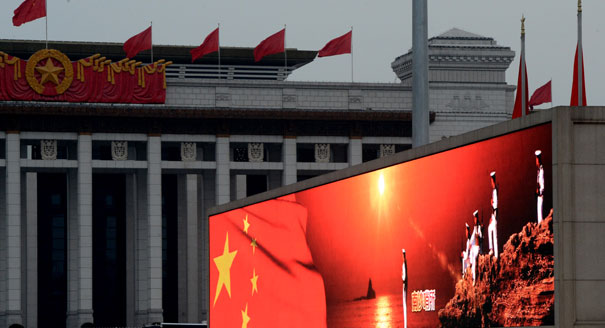Registration
You will receive an email confirming your registration.
IMGXYZ4243IMGZYXIn a panel discussion cohosted with BBC Radio 4’s the World Tonight, Carnegie’s Paul Haenle, Eurasia Group’s Ian Bremmer, Peking University’s Wang Yizhou, and Renmin University’s Jin Canrong explained that strategic mistrust and a lack of understanding between China and the United States and China and Japan could have far-reaching global repercussions if not addressed.
As China becomes an increasingly important global player, defining the country’s foreign policy and how it wants to be perceived in the region and beyond will become an increasingly important task for China’s policymakers. Equally, it still remains unclear how much China considers current global norms and standards to be in its best interest and whether China will fulfill the role of the “responsible stakeholder” so desired by other major powers.
Main Foreign Policy Challenges for China
Domestic issues top the new Chinese leadership’s agenda, panelists agreed. However, there is significant pressure on China to take a global leadership role and move away from its non-interventionist policy.
- Overcoming Mistrust: All four panelists agreed that one of the biggest challenges for Xi Jinping is strengthening strategic trust with the United States and stabilizing regional relations. Haenle stated that China needs to construct a foreign policy that is conducive to development, which requires stronger multilateral relations. Bremmer pointed toward the East China Sea territorial conflict as an example of how China should increase multilateral engagement.
- Sino-Japanese Tensions: Nationalism runs strong in both countries, causing tension over the East China Sea territorial conflict. Bremmer explained that China believes that the United States enabled and encouraged Japan to claim sovereignty over the Diaoyu/Senkaku Islands. The mutual demonization of both countries has rendered most reconciliation tactics futile, he added.
- Sino-Vietnamese Tensions: Nationalist sentiments between China and Vietnam stem back to the 1979 border war, Shah explained, and as a result, Vietnam feels threatened by China’s growing global influence. Wang pointed out, though, that trade, tourism, and industrial relations between the two countries are still booming. He added that China’s increased maritime presence is not a security threat but serves to protect China’s growing energy imports.
Revamping the U.S. Rebalancing Toward Asia
The United States received strong criticism from China after announcing its “pivot to Asia.” Attempting to move away from a heavy emphasis on the security aspects of the pivot, the United States has renamed the “pivot” as a “rebalancing strategy” and has emphasized the economic and diplomatic components of the strategy.
- A Clash of Exceptionalism: Bremmer explained that China and the United States have two of the most exceptionalist systems in the world. Without mutual trust and tolerance, he argued that China and the United States cannot build mutual trust. Neither the United States nor China can manage future crises without a formalized platform for dialogue, the panelists concluded.
- Clarifying the Pivot: Haenle explained that the “pivot” had been misunderstood. China saw it as a check against its power while Southeast Asian countries interpreted this move as a reassurance. Haenle added that both Washington and Beijing need to focus on non-military competition and cooperation to alleviate misunderstandings and tension.
